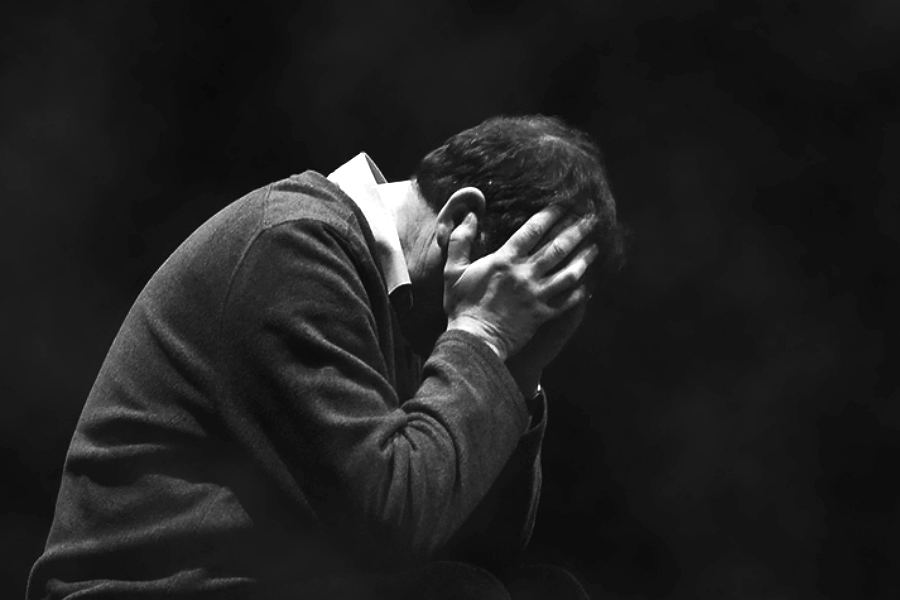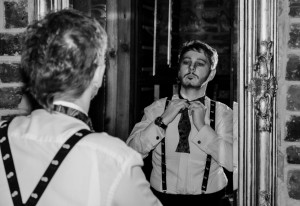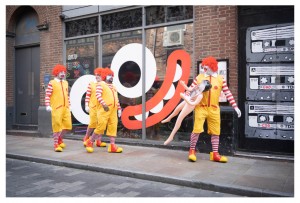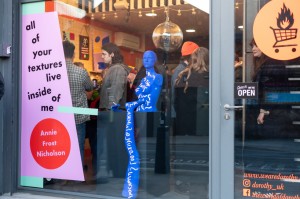Living With Macbeth @ Unity Theatre

A deadly duo of anger and guilt were perfectly executed under the spotlights at the Unity Theatre last weekend …
Two broken characters, a Shakespearean actor (Number One) and a comedian (Number Two), sit next to each other on a bare stage, separated only by a few feet and a laundry bag full of props. What can only be described as lounge or apartment music plays soothingly in the background. You sense that you’re in for a dark showdown between the two, and you’d be right.
Described as ‘a psychological story about reminiscence and past glories. About actors and what they do … and what they should not do’, this is Living With Macbeth, the latest play to grace the Unity Theatre’s Stage II space. Written by and starring Storm Theatre‘s Kevin Brannagan and Paul Braithwaite (the latter also directed), this is a passion project stemming from both actors’ own careers and experiences. Debuting at Threshold Festival in 2011, festival director Chris Carney was assistant director (having been a part of Storm Theatre group for years), Kaya Herstad Carney composed a beautiful original score, with minimalist design and effects by Gray Hughes.
Despite an uncomfortable first fifteen minutes (when we don’t know whether the silence is deliberate or the actors have forgotten their lines), we are pulled into the narrative, and start to become emotionally involved in the story. Number One and Two are at war; One, a serious theatre actor, demoted to playing Macduff to the comedian’s Macbeth, in a performance designed to push the comedian into a more serious profession. Two, the stand-up, whose latest claim to fame is having sex with an air-head on Big Brother, defending the skill of “making people laugh” as a “noble profession.” Both are burning with resentment, and as more of the story is revealed, the audience becomes privy to a tale of ambition, jealousy and failure.
There are wonderful parallels with Macbeth. Lying just under the surface is a heap of guilt, lurching between regret of mistakes made, and hurt egos and anger. One of the most powerful moments comes from the two characters playing Macbeth and Lady Macbeth in a scene from Shakespeare’s Act II, after ‘the deed’: “To know my deed, ’twere best not know myself”.
That’s not to say that humour and self-deprecation isn’t present – there were several laugh-out-loud moments, including Number One’s use of a puppet to depict one of Macbeth’s soldiers. The actors really are brilliantly cast, having a confident grip on the language of Shakespeare as well as their contemporary characters and the problems than span both stories.
One of the major themes to linger well after the curtain call is how we deal with the creeping of time, when perhaps you have nothing left to live for. This is cleverly intercut throughout the performance with contemporary concerns – our obsession with celebrity, over and above real skill, juxtaposed with the pitfalls of self-pity. As Macbeth’s final soliloquy, Tomorrow, is delivered at the end of the performance, the audience is left guessing as to the fix both characters are left in:
Tomorrow, and tomorrow, and tomorrow,
Creeps in this petty pace from day to day,
To the last syllable of recorded time;
And all our yesterdays have lighted fools
The way to dusty death. Out, out, brief candle!
Life’s but a walking shadow, a poor player
That struts and frets his hour upon the stage
And then is heard no more. It is a tale
Told by an idiot, full of sound and fury
Signifying nothing.
As we pondered this in the theatre bar, we noticed a stroke of genius: tech designer Hughes has mocked up Brannagan on the Culture Show, playing it up on a big screen, as if talking about performance with Andrew Graham-Dixon. We think it’s real until told otherwise. This piece of graphic wizardry adds an added touch of insight to the team behind the play. LWM has been in careful production since they first got together in 1996.
“I’ve been a member of Storm Theatre for ten years”, assistant director Carney remembers. “My first professional play was at the Unity with these guys directed by Paul, alongside Kevin … Essentially, there’s two ways to look at [Living With Macbeth]: the first way is he’s in his apartment, with the ghost of the man he killed. The second is that the entire stage is in his head.”
Our conclusion is if this continues in a run around the north-west, as Storm Theatre are hoping, you should track it down. LWM is a captivating and thought-provoking exploration of Macbeth as both a morality tale, and as a reflection of a life-long commitment to performance.
The group’s next project to show in Liverpool, Much Ado About Everything, is a “calamitous production” of the daft side of theatre and the things that can go wrong. Like how not to die on stage. Watch this space.
Follow Storm Theatre on Twitter to hear about their next performances and tour dates





